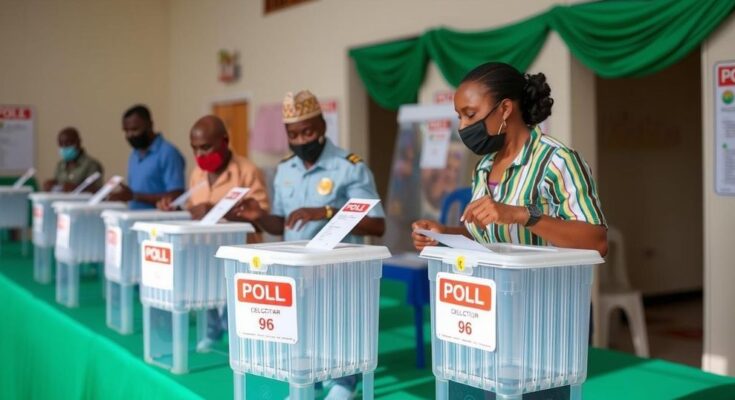Comoros voters are heading to the polls for parliamentary elections amid allegations of prior electoral irregularities under President Azali Assoumani’s administration. With approximately 338,000 voters registered and almost 100 candidates contesting, the political landscape remains tense. Opposition parties experience division regarding election participation, as some call for a boycott over concerns of authoritarianism. Results are anticipated by Friday.
Voters in Comoros are participating in elections for the 33-seat parliament, following a controversial re-election of President Azali Assoumani last year, which was criticized by the opposition due to alleged electoral misconduct. Polling stations opened early on Sunday for approximately 338,000 registered voters, reflecting a continuation of democratic processes post the last parliamentary elections in January 2020. Despite almost 100 candidates approved by the Supreme Court to run, tensions remain high as accusations of authoritarianism surface against President Assoumani, who has been in power since a coup in 1999.
Amidst these political dynamics, some opposition factions, including the Juwa party led by former President Ahmed Abdallah Sambi, have advocated for a boycott of the elections, while others oppose this strategy. Notably, opposition candidate Hamidou Karihila from the Hope of the Comoros party emphasized the importance of participation, stating that it exposes the regime’s deficiencies and hastens its decline. The election results are anticipated by Friday, adding to the ongoing political dialogue in the region.
Comoros, an Indian Ocean archipelago, has a complex political history marked by instability and coups, particularly since President Azali Assoumani first assumed power in 1999. His tenure has seen accusations of authoritarian rule, particularly following the consolidation of power within his family, notably when he appointed his son, Nour El-Fath, to oversee government operations in 2024. The political environment is further complicated by previous elections perceived as marred by irregularities, fostering a landscape of distrust towards the ruling regime. This election, amidst calls for a boycott from certain opposition leaders, underscores the ongoing struggle between the government and its challengers, reflecting broader issues of governance and civil rights in the nation.
The ongoing parliamentary elections in Comoros present a critical moment in the nation’s political landscape, with voter turnout reflecting public engagement despite fears of authoritarianism. As various political factions navigate their strategies in response to the ruling party’s dominance, the outcome of these elections will play a significant role in shaping the future of governance in Comoros. Observers await the results, which are expected by Friday, to gauge the electorate’s stance towards the current administration and its policies.
Original Source: www.thesenior.com.au




